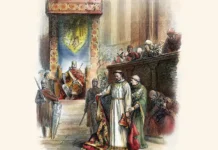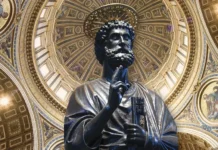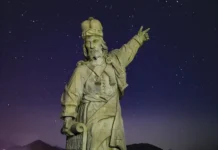These blessed children, the first to participate in the sufferings of Christ, would also be among the first to benefit from the infinite merits of His glorious Passion and reign together with Him in Heaven.
Sensing that his death was approaching, the venerable old man called his twelve sons to his bedside to bless them before departing from this world. He withdrew the primacy from his firstborn Reuben, due to his improper conduct, as well as from the next two, Simeon and Levi, because of their cruelty (cf. Gn 49, 3-7). It fell to Judah, the fourth son, to receive from his father authority over his brothers and the privilege of having his lineage graced with the Messiah, concerning whom God had promised to Abraham: “By your descendants shall all the nations of the earth bless themselves” (Gen 22:18). Thus, sixteen centuries before the birth of Jesus in Bethlehem, the patriarch Jacob prophesied the coming of the Redeemer.
The old patriarch described the arrival of this awaited king with these words: “The sceptre shall not depart from Judah, nor the ruler’s staff from between his feet, until he comes to whom it belongs; and to him shall be the obedience of the peoples” (Gen 49:10).
Later, the lineage of Judah did in fact rule the other tribes, in the person of David, occupying the throne in Jerusalem. Although, due to the infidelity of his successor Solomon, God withdrew from David’s descendants dominion over the ten tribes—allowing the establishment of the “kingdom of the North” ruled by King Jeroboam, a simple servant—David was never without “a lamp” (1 Kgs 11:36), as was promised to him: “I will not take my steadfast love from him, as I took it from Saul, whom I put away from before you. And your house and your kingdom shall be made sure for ever before me; your throne shall be established for ever” (2 Sm 7:15-16). Therefore, until the entrance of Nebuchadnezzar, King of Babylon, who devastated the city and took the entire population into captivity, there was always a son of David, from the blessed lineage of Judah, seated on the legitimate throne of his father.

The sons of Levi rule the Chosen People
When after seventy years of this painful exile, Cyrus the Great of Persia conquered Babylon, he issued a decree authorizing the Israelites to return to their homeland (cf. Es 1:2-4). Many of them, then, including a large contingent of priests and Levites, undertook the journey back to Jerusalem (cf. Es 2:1-67).
The preponderant influence exercised by the priestly caste during this new era gave rise to an increasingly religious climate, Israel becoming a small, progressively theocratic state. 1 Indeed, despite the country’s continuing under foreign dominion— first the Persians and then the Greeks — the high priests became the true power holders, assisted by a council of elders constituted by an aristocracy, itself made up mostly of priests.
In the second century BC, when Antiochus Epiphanes, a “contemptible person” (Dn 11:21) and a true “sinful root” (1 Mac 1:11), ascended the throne of Syria, furious persecution broke out against the religion of Israel. The Maccabees, from the priestly lineage, rebelled against the Seleucid, achieving great victories and acquiring for the Jewish nation a power and glory comparable to that of former times. Many Israelites believed that this triumph was a sure sign of God’s hand, transferring the royalty of David’s house to the tribe of Levi. Therefore, the descendants of these heroes, called Hasmoneans, came to occupy both the office of High Priest and the royal throne.
Although the sceptre had been taken from the tribe of Judah many centuries before, Israel continued to be governed by sons of Jacob, successors of the Patriarch Abraham, and heirs to God’s promises.
Herod: the bloodthirsty king
The situation changed when, alleging the fratricidal fights that arose within the bosom of the Hasmonean family, Rome intervened militarily and Emperor Mark Anthony bestowed the title of king of the Jews to a foreigner named Herod, detested by the people for belonging to the Edomites, irreconcilable enemies of Israel.
The prophecy of Jacob was reaching fulfillment: even though the rule of Herod marked a period of terror, humiliation and tyranny for the Jewish people, there were still many just and pious souls who knew how to interpret events and recognize that the time of the Messiah had arrived.
The new monarch soon demonstrated that all his actions and administrative decisions were motivated by covetous pride. The hatred and contempt of his subjects weighing upon him, added to the natural insecurity of one who is excessively ambitious, made him regard anyone with outstanding qualities, who garnered the support of the people, as a threat to his power.
Throughout the years of his long reign, he unscrupulously did away with all conspirators or those simply casting a shadow on his person. One by one, his closest relatives, including his wife Mariamne and three children, and many aristocrats from Judea perished under his cruelty. Nothing could withstand his brutal will, seething with arrogance and thirst for power.

The tyrant trembles before a Child
Already quite old and embittered by the weight of his countless crimes, how shocked the bloodthirsty tyrant must have been to see the arrival of a magnificent caravan from the Orient with three wise men who inquired after “He who has been born king of the Jews” (Mt 2:2). Agitation and consternation immediately seized his heart; he felt the stability of his throne being threatened.
This agitation clearly showed how far God was from his thoughts and outlooks, as a pious author astutely comments: “An upright and sincere soul is never perturbed, because it possesses God. Where God dwells, agitation is not possible, says the Holy Spirit. ‘Non in commotione Dominus’ (1 Kgs 19:11). If a soul happens to experience agitation, it is because it has lost God and, with Him, uprightness and innocence. It should not surprise us that Herod became restless. After all, he was a usurper and, upon hearing that a king of the Jews had been born, he certainly feared to lose both the throne as well as the crown.” 2
However, using the characteristic cunning of the “sons of this world” (Lk 16:8), Herod inquired of the priests and teachers of Scripture the location indicated by the prophets as the birthplace of the Messiah. Once he had obtained a response, he resolved to kill the newborn infant. Feigning great piety, he called the wise men so as to point out to them the way to Bethlehem—in reality, intending to use them for the fulfillment of his wicked scheme.
Blinded by pride, the iniquitous monarch believed he had the power to oppose the divine plan; to change, according to his whim, what God had ordained from all eternity and proclaimed by the mouth of His messengers!
In this regard, St. John Chrysostom comments: “Such is evil by its very nature: contradicting itself and undertaking that which is impossible. Consider Herod’s madness. If he believed in the prophecy and considered its fulfillment inevitable, he was clearly attempting to do something impossible; if he neither believed nor expected the fulfillment of it, there was no reason for fear and worry, or to set traps for anyone. In neither of the two hypotheses was it necessary to lie.” 3
Two discrete interventions of Divine Providence, a dream sent to warn the wise men and the apparition of an angel to St. Joseph, undid the clever machinations of the tyrant. The latter, after impatiently and apprehensively awaiting the return of the noble foreigners for several days, and perceiving that he had been deceived, unleashed his fury and resolved to commit the most horrific crime of his life. To prevent the little King of the Jews from escaping his vengeance, all the infants of Bethlehem and neighbouring regions must die.
Martyrdom of the innocents
The alarm raised in Bethlehem was tremendous. Having just been honoured by receiving the Expected one of the nations, its homes were now filled with cadavers and its streets with the echoes of mothers’ sorrowful wailing, intermingled with the cries of children. It was a poignant, atrocious scene—babies being wrenched from maternal arms and pierced by the swords of mercenaries.
“Why did Christ proceed in this way?” asks St. Peter Chrysologus. “Why did He abandon those whom He knew were sought because of Him and had to die because of Him? He was born king, and king of Heaven; why did he abandon those who were innocent? Why did he disregard this army of his own age? Why did he thus abandon those who, like Him, slept in a crib, while the enemy, who sought only the king, inflicted harm upon all the soldiers?” 4
The same saint answers: “Brethren, Christ did not abandon his soldiers, but destined for them the best fate, granting them triumph before living, having them attain victory without struggle, granting them the crown even before their members were fully developed; He wanted, by His power, for them to override vice and come to the possession of Heaven before earth.” 5
As had been prophesied by David, the sobs of these little martyrs echoed in the presence of the Most High like hymns of glory, while at the same time admonishing the impious king who had condemned them: “Thou whose glory above the heavens is chanted by the mouth of babes and infants, thou hast founded a bulwark because of thy foes, to still the enemy and the avenger” (Ps 8:1-2). Their blood ascended to heaven as the pure and agreeable sacrifice of “lambs without blemish” (cf. Ex 12:2-5) offered in honour of the newborn Divine Infant. The children who played at the feet of their mothers left their innocent games to play at the feet of God’s throne!
With his characteristic eloquence, Bossuet comments: “Blessed children, whose life was immolated so as to preserve the life of your Saviour. If your mothers had known this mystery, instead of lamentations and weeping, only blessings and praise would have been heard.” 6

The anxiety of Herod and triumph of the children
The contrast between Herod’s state of spirit and that of the Holy Innocents is striking: on one hand we see the figure of a man attached to power, jealous for his authority and judging everything from the perspective of his own mediocre interests; on the opposite pole we have innocent children, trusting and admiring, incapable of any evil.
After his heinous crime, Herod experiences an interior sadness and unrest. Not even the news that his orders have been fulfilled affords him tranquility, because, to the constant affliction of losing the throne is added the remorse of infanticide, gnawing at his soul like the worms that, in a short while, will consume his flesh.
The children, on the contrary, find themselves raised to the level of Christ’s brethren and princes of His Kingdom. In his love, He gathered them like buds whose life was just beginning to blossom, to take them to the beatific vision as soon as He triumphantly opened the gates of heaven.
How, St. Bernard asks, “could anyone doubt the crowns of the Innocents?” And he continues: “Is the compassion of Christ perhaps less than the cruelty of Herod, to believe that the latter could put innocent ones to death and Christ could not crown those who died for Him? […] They are truly thy martyrs, O God, so that the privilege of thy grace in those in whom neither man nor angel finds any value may shine more clearly.” 7
Childhood, rule of innocence
The Word became flesh and came into the world to accomplish the Redemption and, from that moment, to establish upon the earth “the year of the Lord’s favour” (Is 61:2), a new regime, based on charity and mercy, by which man passed from the state of slavery to that of sons of God, having as a rule of life to strive for perfection, in imitation of the heavenly Father (cf. Mt 5:48).
To be his disciples, Jesus does not order us to acquire scholarly knowledge, nor does He demand the practice of severe penances and austerities. Rather, He proposes a rule accessible to all: “Truly, I say to you, unless you turn and become like children, you will never enter the kingdom of heaven” (Mt 18:3).
In one of his sermons, Pope St. Leo I affirms: “Christ loves the childhood that he first took up in both soul and body. Christ loves childhood, the teacher of humility, the rule of innocence, the image of gentleness. Christ loves childhood, to which he directs the characters of older people, to which he brings back to old age. Those whom he would raise up to an eternal kingdom he disposes to follow his own example.” 8
To be partakers of His Kingdom and sharers in the eternal banquet, we are called to let God lead us like docile and trusting children, without raising obstacles to His holy will.
Each Christmas, Jesus invites us to the restoration of innocence, and He is ready to re-establish it in the heart of those who wish to benefit from his grace, since of ourselves we do not have the power to free ourselves from sin.
He Himself awaits us and gives Himself to us as recompense at the hour of our death, making us heirs of eternal happiness: “Let the children come to me, and do not hinder them; for to such belongs the kingdom of heaven” (Mt 19:14). ◊
Notes
1 Cf. ROBERT, André; TRICOT, A. Initiation biblique. 2.ed. Paris: Desclée et Cie., 1948, p.679.
2 D’HAUTERIVE, P. La suma del predicador. Paris: Louis Vivès, 1888, t.II, p.104.
3 ST. JOHN CHRYSOSTOM. Homilías sobre el Evangelio de San Mateo. Obras. 2.ed. Madrid: BAC, 2007, t.II, p.131.
4 ST. PETER CHRYSOLOGUS. Apud La Biblia comentada por los Padres de la Iglesia. Thomas Oden (Org.). Madrid: Ciudad Nueva, 2004, p.78.
5 Idem, ibidem.
6 BOSSUET, Jacques Bénigne. Œuvres choisies de Bossuet. Versailles: J. A. Lebel, 1821, p.425.
7 ST. BERNARD OF CLAIRVAUX. Obras completas. Madrid: BAC, 1953, t.I, p.292-293.
8 ST. LEO THE GREAT. Sermons. 2.ed. Paris: Du Cerf, 1964, t.I, Sermo VII in Epiphaniae Solemnitate, p.280.







